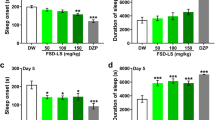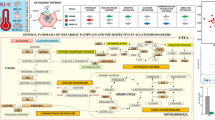Abstract
The objective of this study was to determine the effect of salinity on anxiety behavior and liver antioxidant capacity in the guppy (Poecilia reticulata). Guppies were exposed to salinities of 0‰, 5‰, 10‰, 15‰ and 20‰ for acute stress tests, and then we analyzed the activity of antioxidant enzymes at 3, 6, 12, 24, 48, 72 and 96 h. During the experiment, the anxiety behavior of guppy was enhanced at salinities of 10‰, 15‰, and 20‰, as evidenced by a significantly higher latency time for the first passage through the upper part than that of the control group (P < 0.05). CAT activity was highest at 24 h in the treatment with the salinity of 10‰, and SOD and GPX activities were highest at 12 h into the treatment with the salinity of 10‰. The SOD and CAT activities were significantly higher than the control group after 96 h of treatment at different salinities (P < 0.05). The MDA contents of the experimental groups at salinities of 5‰ and 10‰ were not significantly different from the control group after 96 h of treatment (P > 0.05). While the MDA contents of the experimental groups at salinities of 15‰ and 20‰ were still significantly higher than the control group after 96 h of treatment (P < 0.05). The experimental results indicated that elevated salinity could lead to oxidative stress in the guppy, altering their anxiety behavior as well as the activity of antioxidant enzymes. In conclusion, drastic changes in salinity during culture should be avoided.


Similar content being viewed by others
Data availability
The data used in this study are available from the corresponding author.
References
Abhipsa B, Falguni P, Samar GP, Kajari D, Pawan KA, Biswaranjan P (2021) Modulation of physiological oxidative stress and antioxidant status by abiotic factors especially salinity in aquatic organisms. Comp Biochem Physiol C Toxicol Pharmacol 241:108971. https://doi.org/10.1016/j.cbpc.2020.108971
Bian P, Qiu C, Xu S, Lin S (2014) Effects of salinity on growth, activity of non-specific immune and antioxidant enzymes in obscure Puffertakifugu obscurus. Acta Hydrobiol Sin 38(001):108–114. (in Chinese) https://doi.org/10.7541/2014.14
Canli EG, Gülüzar A, Eroglu A, Canli M, Dogan Z (2014) Effects of fish size on the response of antioxidant systems of Oreochromis niloticus following metal exposures. Fish Physiol Biochem 40:1083–1091. https://doi.org/10.1007/s10695-014-9907-x
Champagne D, Hoefnagels C, Kloet R, Richardson M (2010) Translating rodent behavioral repertoire to zebrafish (Danio rerio): Relevance for stress research. Behav Brain Res 214(2):332–342. https://doi.org/10.1016/j.bbr.2010.06.001
Chen X (2012) Effect of salinity stress on the physiological and biochemical characteristics of Managua Cichlid, Cichlasoma managuense. Dissertation, Xiamen University, Xiamen, China. (in Chinese)
Dong L, He Y, Wang Y, Dong Z (2013) Research progress on application of superoxide dismutase (SOD). J Agric Sci Technol 05:53–58. (in Chinese) https://doi.org/10.3969/j.issn.1008-0864.2013.05.08
Fan C (2011) Effects of salinity and oxygen stress on physiological factors of Trachinotus ovatus. Dissertation. Shanghai Ocean University, Shanghai, China. (in Chinese)
Geng C, Tian Y, Zhang Y, Chang Y, Song J (2015) Effects of acute low salinity stress on the physiological indices of Apostichopus japonicus. J Fish Sci China 22(4):666–674. (in Chinese) https://doi.org/10.3724/SP.J.1118.2015.140506
Ghanavatinasab Y, Salati AP, Movahedinia A, Shahriari A (2019) Changes in gill antioxidant status in Acanthopagrus sheim exposed to different environmental salinities. Iran J Sci Technol Trans A Sci 43:1479–1483. https://doi.org/10.1007/s40995-018-0663-0
Guo S (2018) Immune effects in zebrafish after full life-cycle exposure to environmentally relevant concentrations of cadmium. Dissertation. Zhejiang Ocean University, Zhejiang, China. (in Chinese)
Horie Y, Takahashi C (2021) Influence of salinity on physiological development and zinc toxicity in the marine medaka Oryzias melastigma. Ecotoxicology 30:1138–1149. https://doi.org/10.1007/s10646-021-02429-y
Hossain MA, Aktar S, Qin JG (2016) Salinity stress response in estuarine fishes from the Murray Estuary and Coorong, South Australia. Fish Physiol Biochem 42:1571–1580. https://doi.org/10.1007/s10695-016-0241-3
Kang Z, Deng C, Yu H, Lin X, Huang Y (2013) Study advances in the effect of salinity change on fish. J Fujian Fish 05:63–69. (in Chinese) https://doi.org/10.3969/j.issn.1006-5601.2013.05.011
Kellner M, Porseryd T, Hallgren S, Porsch-Hällströma I, Hansenb S, HOlséna K (2016) Waterborne citalopram has anxiolytic effects and increases locomotor activity in the three-spine stickleback (Gasterosteus aculeatus). Aquat Toxicol 173:19–28. https://doi.org/10.1016/j.aquatox.2015.12.026
Leandro PB, Danilo CB, Carine FS, Fernanda CO, Roger W, Bernardo B, Adalberto LV, Matheus DB (2021) Dietary supplementation with nerolidol improves the antioxidant capacity and muscle fatty acid profile of Brycon amazonicus exposed to acute heat stress. J Therm Biol 99:103003. https://doi.org/10.1016/j.jtherbio.2021.103003
Liu M (2019) The effects of quercetin on anxiety and shoaling behaviors in zebrafish (Danio rerio) and mechanisms involved. Dissertation, Henan University of Science and Technology, Henan, China. (in Chinese)
Liu R (2013) The effects of salinity and temperature on physiological function of selective group of Trachinotus ovatus. Dissertation, Shanghai Ocean University, Shanghai, China. (in Chinese)
Liu S, Zhai S (2012) Research progress of effects of oxidative stress on fish and oxidative stress model. Feed Rev 2:48–51. (in Chinese) https://doi.org/10.3969/j.issn.1001-0084.2012.02.020
Najafi A, Salati AP, Yavari V, Asadi F (2014) Effects of short term starvation and refeeding on antioxidant defense status in Mesopotamichthys sharpeyi (Günther, 1874) fingerlings. Int J Aquat Biol 2(5):246–252
Shen F, Chen Z (2009) Fish monitoring system and selection of fish for early warning. Fish Sci Technol Inf 05:217–220. (in Chinese) https://doi.org/10.3969/j.issn.1001-1994.2009.05.002
Srikanth K, Pereira E, Duarte AC, Ahmad I (2013) Glutathione and its dependent enzymes’ modulatory responses to toxic metals and metalloids in fish—a review. Environ Sci Pollut Res 20:2133–2149. https://doi.org/10.1007/s11356-012-1459-y
Stewart AM, Grossman L, Collier AD et al. (2015) Anxiogenic-like effects of chronic nicotine exposure in zebrafish. Pharmacol Biochem Behav 139:112–120. https://doi.org/10.1016/j.pbb.2015.01.016
Taghipoor K, Keyvanshokooh S, Salati AP, Pasha ZH, Babaheydari SB (2016) Effects of triploidy induction on antioxidant defense status in rainbow trout (Oncorhynchus mykiss) during early development. Anim Reprod Sci 171:108–113. https://doi.org/10.1016/j.anireprosci.2016.06.005
Tu X, Li Y, Chen Q, Shen Y, Liu Z (2020) Tributyltin enhanced anxiety of adult male zebrafish through elevating cortisol level and disruption in serotonin, dopamine and gamma-aminobutyric acid neurotransmitter pathways. Ecotoxicol Environ Saf 203:17–25. https://doi.org/10.1016/j.ecoenv.2020.111014
Wang R, Dai L, Chen Y, Xu Y (2019) Effects of short-term temperature or salinity stress on feeding behavior and antioxidant of Marine Medaka (oryzias melastigma). Oceanol Limnol Sin 50(02):378–387. https://doi.org/10.11693/hyhz20181000234
Wang W, Wu J, Su S (2008) Effects of salinity stress on antioxidant enzymes of Penaeus monodon of two different life stages. Comp Biochem Physiol C 148(4):466. https://doi.org/10.1016/j.cbpc.2008.10.069
Wang X, Zhang X, Li W (2005) Effects of salinity on the non-specific immuno-enzymetic activity of Sebastes schlegeli. Mar Fish Res 26(6):17–21. (in Chinese) https://doi.org/10.1360/biodiv.050121
Wu Y, Ye K, Wang Z, He S, Wang Q (2020) Effects of low salinity culture on growth, muscle nutritional composition and antioxidant capacity of Larimichthys crocea. J Jimei Univ (Nat Sci) 25(3):171–179. (in Chinese) https://doi.org/10.19715/j.jmuzr.2020.03.02
Xu Y, Sun B (2012) Effect of salinity stress on the growth, body composition and enzyme of juvenile Hippocampus kuda. Oceanol Limnol Sin 43(6):1279–1285. (in Chinese) https://doi.org/10.11693/hyhz201206036036
Yang J, Chen G, Huang J, Zhang J, Shi G, Tang B, Zhou H (2007) Effects of temperature and salinity on the growth and activities of antioxidant enzymes of cobia (Rachycentron canadum) juveniles. J Guangdong Ocean Univ 27(4):25–29. (in Chinese)
Yashika A, Arun R, Rajesh P, Manoj K, Sunil PT (2018) An in vivo analysis of Cr6+ induced biochemical, genotoxicological and transcriptional profiling of genes related to oxidative stress, DNA damage and apoptosis in liver of fish, Channa punctatus (Bloch, 1793). Aquat Toxicol 200:158–167. https://doi.org/10.1016/j.aquatox.2018.05.001
Yin F, Sun P, Peng S, Shi Z (2011) Effects of low salinity stress on the antioxidant enzyme activities in juvenile Pampus argenteus liver and the APTase activities in its gill and kidney. Chin J Appl Ecol 04:1059–1066. (in Chinese) https://doi.org/10.3724/SP.J.1011.2011.00415
Yuan X, Yan Y, Shi Y (2020) Effects of salinity on growth, body composition, digestive enzyme and antioxidant enzyme activities of juvenile Sebastisucus Marmoratus. Acta Agric Shanghai 36(2):114–119. (in Chinese) https://doi.org/10.15955/j.issn1000-3924.2020.02.19
Zhang C, Zhang Y, Gao Q, Peng S, Shi Z (2015) Effect of low salinity stress on antioxidant function in liver of juvenile Nibea albiflora. South China Fish Sci 11(004):59–64. (in Chinese) https://doi.org/10.3969/j.issn.2095-0780.2015.04.009
Zhang L, Dong X, Zhu Y, An L, Meng Q, Yang L (2015) Effects of acute salinity stress on antioxidant enzyme activities in liver and Na+/K+-ATPase activities of gill in Procambarus clarkii. Freshw Fish 4:89–93. (in Chinese) https://doi.org/10.3969/j.issn.1000-6907.2015.04.015
Zhang Y, Yang J, Geng L, Wang Y, Jiang H, Xu W (2021) Effects of salinity stress on antioxidant enzymes and serum cortisol in luciobarbus capito. Prog Fish Sci 42(01):56–62. (in Chinese) https://doi.org/10.19663/j.issn2095-9869.20191015001
Acknowledgements
This work was supported by the National Natural Science Foundation (China, 32002405) and the Henan Natural Science Foundation (202300410130).
Author contributions
MX: Data curation, methodology, writing-original draft. CZ: Supervision, project administration, writing-reviewing and editing. QQ: Data curation, writing-reviewing and editing, validation. RW: Conceptualization, writing-reviewing and editing, validation. SZ: Writing-reviewing and editing, validation. RY: Writing-reviewing and editing, validation. BL: Writing-reviewing and editing, validation. SL: Writing-reviewing and editing, validation.
Author information
Authors and Affiliations
Corresponding author
Ethics declarations
Conflict of interest
The authors declare no competing interests.
Ethical approval
All experimental animal procedures used in this study were approved by the Animal Care and Ethics Committee of Henan University of Science and Technology.
Rights and permissions
Springer Nature or its licensor (e.g. a society or other partner) holds exclusive rights to this article under a publishing agreement with the author(s) or other rightsholder(s); author self-archiving of the accepted manuscript version of this article is solely governed by the terms of such publishing agreement and applicable law.
About this article
Cite this article
Xu, M., Zhang, C., Qi, Q. et al. Effects of salinity stress on anxiety behavior and antioxidant capability of guppy (Poecilia reticulata). Ecotoxicology 32, 598–605 (2023). https://doi.org/10.1007/s10646-023-02667-2
Accepted:
Published:
Issue Date:
DOI: https://doi.org/10.1007/s10646-023-02667-2




